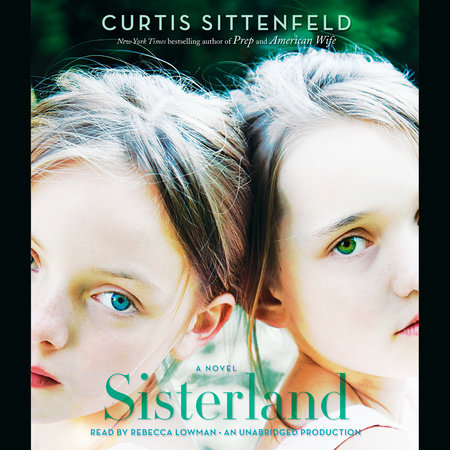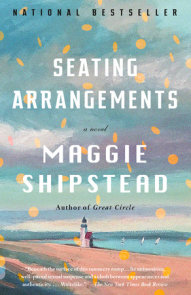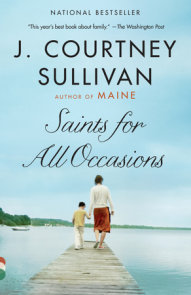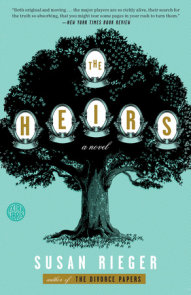READERS GUIDE
A Conversation with Curtis Sittenfeld and The Rumpus’s Amy Gentry, August 2013Amy Gentry: A lot of your female, first-person characters have an investment in conformity and flying under the radar. Why are you interested in those characters particularly? Because, especially in Sisterland, you had a choice. You could have written from Vi’s point of view instead.
Curtis Sittenfeld: I find people who, at first glance, appear to be typical or average, whatever that means, and then turn out to have hidden qualities, to be very interesting—much more interesting than someone whose eccentricities announce themselves immediately and can turn out to be superficial. So I think that that’s part of it. When I was younger—when I, myself, was a teenager—I gave people the benefit of the doubt, thinking, so many people that appear very calm and even boring must have all these wild emotions and crazy ideas. As I’ve gotten older I’ve unfortunately come to the conclusion that a lot of people who seem normal and boring are normal and boring. But in a novel, I have the privilege of making people more layered.
AG: You include a lot of finely rendered psychological detail. I wonder how that developed for you? Were you conscious of going after that psychological realism?
CS: I wouldn’t ever, while writing, think to myself, “I need a little more psychological realism.” I write what’s interesting to me, and so if I’m reading I like to have a very thorough idea of a character in a book that’s by someone else. I like it when characters are some combination of appealing and flawed or self-interested. I think in terms of scenes, and what I want a scene to achieve, and the psychological realism arises from that. It just kind of works its way up. I have my first-person narrators make a lot of observations, I have lots of dialogue, and so it bubbles up out of that.
AG: A lot of the psychological details tend to be these very fine observations that the character is making about the social interactions happening around her. Do you have a special interest in social dynamics?
CS: To some extent, I do. Tonight I’ll go with my family to a neighbor’s house for a little cookout, and it’s not as if I’ll be mentally taking notes. I would not be above borrowing something juicy if it happened, but I interact fairly normally in social situations. I think that a lot of people can be having these interactions, and then afterwards you make some observations that you weren’t even conscious of making in the moment.
AG: Did you ever wish that you were a twin?
CS: Yeah, I would have liked to have been a twin. I have a sister who’s two years older, a sister who’s five years younger, and a brother who’s nine years younger, so there was lots of sibling in my life already. But I will say that sometimes my sisters and I get mistaken for twins, and I always take it as a compliment. My sisters and I were having dinner at a Mexican restaurant in Washington, D.C., and we got mistaken for triplets, and we were extra-complimented. At least I was. Maybe they weren’t, but I was.
AG: Why is that, do you think?
CS: I guess because twins have this mystique, and triplets—the normal sibling connection potentially can be very powerful, and there’s this idea that it’s even more powerful with twins. It really is not just someone like me, but another version of me.
AG: Did you talk to identical twins when you wrote the book?
CS: Yes. I’m friends with these twins who, they’re about to turn forty, and they don’t know if they’re identical or not. I guess they’ve never had the test, and I think they are, but I guess it’s not clear. By total coincidence, my British editor is an identical twin. So my friend Emily the twin—she’s a novelist, too, Emily Jeanne Miller—and my British editor read early drafts, and I specifically asked them to pay attention to anything that smelled wrong, twin-wise, and actually, neither of them had any twin concerns. Then the funny thing was, a magazine editor read an early copy, and I didn’t even know this woman was an identical twin. She said, “You nailed it.” But there’s a part where it’s New Year’s Eve and the twins are at a party and one of them kisses the other on the lips, and she said, “That was totally disgusting, but otherwise everything rang true.”
AG: Yet you kept it in.
CS: I did keep it in. I think by the time she read it, it was too late to change it. Being disgusting wouldn’t have deterred me anyway.
AG: Were you ever tempted to write from multiple points of view? From Violet’s point of view?
CS: No, I wasn’t. I understand why that question would come up. It’s funny, because readers like Vi. Some readers don’t, but a lot of readers think she’s refreshing and funny. But if she were the one telling the story, I think they would not like her. People would find her kind of obnoxious.
AG: Yeah, she’s a great character, but I can see where she’s better from the outside.
CS: Less is more.
AG: Part of what makes her great is how monstrous she is.
CS: Unapologetically monstrous—and the fact that she’s unapologetically monstrous, but she’s not a hundred percent monstrous. I think that she has very endearing qualities.
AG: Like what?
CS: She’s very blunt. She’s very entertaining. She’s unapologetic. She has an ability to enjoy herself.
AG: And yet you feel like if you were with her she might be enjoying herself more than you.
CS: Yeah, at your expense.
AG: Getting to the psychic connection the twins have, their powers—we never find out if there’s an entity behind their psychic abilities, and if it’s a force for good or evil. How did you make that decision, not to explain?
CS: The twins believe that they are psychic, and so essentially the book accepts that they are psychic, and neither the book nor the characters are trying to prove to the reader that they are. They just believe they are, which I think is much more natural. It’s almost like in life we’re most hell-bent on proving things that we’re not really sure are true. I didn’t want to present it in a defensive way, I wanted to present it in a matter-of-fact way.
AG: Is Sisterland your first exploration of nonrealist themes?
CS: It’s funny when someone says that, because now I know whether you believe in psychic ability.
AG: Well, do you believe in psychic abilities?
CS: I’m open to them. So you know, in the book, there’s the character Hank? He basically says there are a lot of things in the world that are weirder than psychic abilities, that we accept as true. There’s a lot that’s not explained about the universe. And so, psychicness is not stranger than that. And I’m in agreement with Hank. It’s not like I consider myself to have psychic abilities. I guess I consider myself at times to have intuition. But I also don’t feel the book is supposed to be an exposé about how psychics are frauds.
AG: I certainly didn’t read it that way. But at the same time it was interesting trying to suss out where the book was going to fall on that issue. I never thought that the book was debunking their psychic abilities, but there were times when intuitions proved to be slippery things.
CS: The book is obviously told in first person from the point of view of Kate, who believes that she has psychic abilities and believes that her sister has psychic abilities. And so the book allows for the possibility, no matter what I personally believe. But there came a point where I realized I do have to come down on one side or the other in terms of how much credibility I’m going to give both the sisters.
AG: Did you do a lot of research about psychics?
CS: I interviewed a psychic years ago for an article before ever writing this, and then I interviewed a different one while working on the book. I went to this New Age bookstore in a distant suburb of St. Louis, where I live. I basically went there thinking, “I’m doing research,” and then I un-ironically bought some crystals. There’s some confusion in my own mind about what I believe. Now that this is my fourth book, I know that writing a novel is not a way to sort out your confusion. I have some confusion about boarding school and what I think of having gone to boarding school, and it turns out that writing Prep did not help me sort out that confusion.
AG: What are you working on now?
CS: Usually I’m very secretive about what I’m doing, but the British publisher HarperCollins has commissioned this project where they’ll have six contemporary writers rewrite each of Jane Austen’s six novels. I’ll be rewriting Pride and Prejudice.
AG: Wow, jackpot.
CS: It’s meant to be fun and amusing. It’ll be set in the United States in the present day. And of course I feel a little ridiculous talking about it, because I understand that I’m not Jane Austen, but it’s—sort of in the way that Clueless is fun, it’s meant to be fun.
AG: Is that a lot of pressure?
CS: It would be pressure if I were saying, “Now I’m going to officially step into Jane Austen’s shoes.” But I don’t feel like that’s what this is.
AG: Sure. And you’ve been at it a long time! You started writing very early.
CS: I did start early. Basically, I started writing fiction as soon as I knew how to read and write. So, whatever, five or six. Then I started being published when I was in high school, which is a double-edged sword. Yes, I have been at it for a while. Now I’m a crusty thirty-seven.
AG: What was the first thing you ever remember writing? The first piece of fiction you ever wrote.
CS: I saw the movie of Annie. I saw it in the theater for my seventh birthday. I remember after that, taking this piece of paper, and—it was actually very Freudian—leaving it on my dad’s desk. It was like: “I am an orphan. My name is Annie.” It was essentially plagiarism. But I believed myself to be writing a story. I would sometimes do research by asking my parents questions. One time I said to them—this was kind of dark—I said to them, “Are people that have cancer not hungry?” And they were very alarmed. They said, “Why?” “I’m writing a story.” I was definitely, obviously weird.
AG: What shaped your tastes as a weird young child writing stories?
CS: My parents would read the Laura Ingalls Wilder books out loud to us, and they also read Stuart Little. We were definitely a reading family, and I loved books. I still feel this way, that a book—and a magazine, too—is what’s interesting about life in this distilled format that you can hold, and there’s something very enchanting to me about that. That it’s interesting stories and pictures, and someone took all this time to strip away the boring stuff, and just give you this story and these facts. If I’m at somebody’s house and they have magazines on the table and people are chatting, I feel almost a physical urge to start reading the magazines instead of talking to people. Of course a magazine is usually more interesting than a conversation, because so much more time and preparation has gone into it.
Questions and Topics for Discussion
1. What and where is Sisterland? If you have a sister, do you see any of your own relationship with her reflected in the relationship between Kate and Vi?
2. The novel opens with a description of the 1811 earthquake in New Madrid, although everything that follows is set in the near-present. Why do you think the novel begins in this way? How does the historical context change how we see Kate’s story?
3. Do you believe that people can have psychic powers? Have you ever experienced strong intuitions about events that happened later?
4. Do you understand why Kate tries to escape her powers? Would you prefer, like Kate, to be normal, or to be special, like Vi?
5. Kate transforms herself from Daisy Shramm to Kate Tucker. How do names define and shape us?
6. Near the end of the novel, Kate and Vi make an important discovery about their “senses” that upsets everything they thought they knew. Were you as surprised by this revelation as the twins? How do you think it might change their understanding of their childhood?
7. Do Kate and Jeremy have a good marriage?
8. Were you surprised by Kate’s choices at the end? How will her family’s life in the future be different from what it was in the past? Do you think it’s plausible that she can continue to conceal her secret indefinitely?
9. Twins are intriguing to many people. Do you think the interest they elicit is justified? Have you known twins in your own life? If you are a twin, did Sittenfeld’s portrayal of them strike you as realistic?
10. Have you read any of Curtis Sittenfeld’s other novels? If so, do you think this one is like or unlike her earlier work?






















